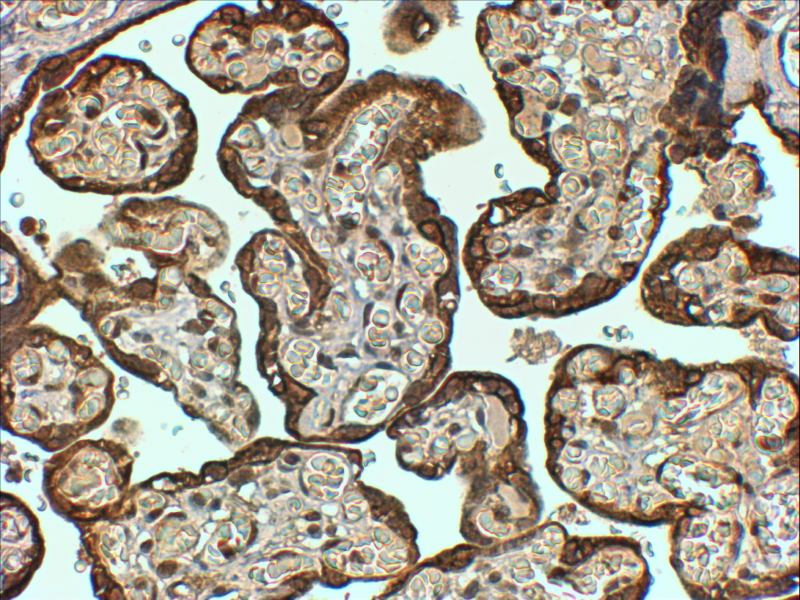Goat Anti-PAI1 / SERPINE1 Antibody
Peptide-affinity purified goat antibody
- SPECIFICATION
- CITATIONS
- PROTOCOLS
- BACKGROUND

Application
| WB, IHC, Pep-ELISA |
|---|---|
| Primary Accession | P05121 |
| Other Accession | NP_001158885, 5054 |
| Reactivity | Human |
| Predicted | Dog |
| Host | Goat |
| Clonality | Polyclonal |
| Concentration | 100ug/200ul |
| Isotype | IgG |
| Calculated MW | 45060 Da |
| Gene ID | 5054 |
|---|---|
| Other Names | Plasminogen activator inhibitor 1, PAI, PAI-1, Endothelial plasminogen activator inhibitor, Serpin E1, SERPINE1, PAI1, PLANH1 |
| Format | 0.5 mg IgG/ml in Tris saline (20mM Tris pH7.3, 150mM NaCl), 0.02% sodium azide, with 0.5% bovine serum albumin |
| Storage | Maintain refrigerated at 2-8°C for up to 6 months. For long term storage store at -20°C in small aliquots to prevent freeze-thaw cycles. |
| Precautions | Goat Anti-PAI1 / SERPINE1 Antibody is for research use only and not for use in diagnostic or therapeutic procedures. |
| Name | SERPINE1 |
|---|---|
| Synonyms | PAI1, PLANH1 |
| Function | Serine protease inhibitor. Inhibits TMPRSS7 (PubMed:15853774). Is a primary inhibitor of tissue-type plasminogen activator (PLAT) and urokinase-type plasminogen activator (PLAU). As PLAT inhibitor, it is required for fibrinolysis down-regulation and is responsible for the controlled degradation of blood clots (PubMed:17912461, PubMed:8481516, PubMed:9207454). As PLAU inhibitor, it is involved in the regulation of cell adhesion and spreading (PubMed:9175705). Acts as a regulator of cell migration, independently of its role as protease inhibitor (PubMed:15001579, PubMed:9168821). It is required for stimulation of keratinocyte migration during cutaneous injury repair (PubMed:18386027). It is involved in cellular and replicative senescence (PubMed:16862142). Plays a role in alveolar type 2 cells senescence in the lung (By similarity). Is involved in the regulation of cementogenic differentiation of periodontal ligament stem cells, and regulates odontoblast differentiation and dentin formation during odontogenesis (PubMed:25808697, PubMed:27046084). |
| Cellular Location | Secreted. |
| Tissue Location | Expressed in endothelial cells (PubMed:2430793, PubMed:3097076). Found in plasma, platelets, and hepatoma and fibrosarcoma cells. |

Thousands of laboratories across the world have published research that depended on the performance of antibodies from Abcepta to advance their research. Check out links to articles that cite our products in major peer-reviewed journals, organized by research category.
info@abcepta.com, and receive a free "I Love Antibodies" mug.
Provided below are standard protocols that you may find useful for product applications.
Background
This gene encodes a member of the serine proteinase inhibitor (serpin) superfamily. This member is the principal inhibitor of tissue plasminogen activator (tPA) and urokinase (uPA), and hence is an inhibitor of fibrinolysis. Defects in this gene are the cause of plasminogen activator inhibitor-1 deficiency (PAI-1 deficiency), and high concentrations of the gene product are associated with thrombophilia. Alternatively spliced transcript variants encoding different isoforms have been found for this gene.
References
The Role of Plasminogen Activator Inhibitor-1 and Angiotensin-Converting Enzyme Gene Polymorphisms in Bronchopulmonary Dysplasia. Ince DA, et al. Genet Test Mol Biomarkers, 2010 Sep 6. PMID 20818980. Tumour budding, uPA and PAI-1 are associated with aggressive behaviour in colon cancer. M脌rkl B, et al. J Surg Oncol, 2010 Sep 1. PMID 20740581. Association of PAI-1 gene polymorphism with survival and chemotherapy-related vascular toxicity in testicular cancer. de Haas EC, et al. Cancer, 2010 Aug 24. PMID 20737565. Failure to lyse venous thrombi because of elevated plasminogen activator Inhibitor 1 (PAI-1) and 4G polymorphism of its promotor genome (The PAI-1/4G Syndrome). Bern MM, et al. Clin Appl Thromb Hemost, 2010 Oct. PMID 20724304. Evaluation of the Association of Urokinase Plasminogen Activator System Gene Polymorphisms with Susceptibility and Pathological Development of Hepatocellular Carcinoma. Weng CJ, et al. Ann Surg Oncol, 2010 Aug 13. PMID 20706793.
If you have used an Abcepta product and would like to share how it has performed, please click on the "Submit Review" button and provide the requested information. Our staff will examine and post your review and contact you if needed.
If you have any additional inquiries please email technical services at tech@abcepta.com.













 Foundational characteristics of cancer include proliferation, angiogenesis, migration, evasion of apoptosis, and cellular immortality. Find key markers for these cellular processes and antibodies to detect them.
Foundational characteristics of cancer include proliferation, angiogenesis, migration, evasion of apoptosis, and cellular immortality. Find key markers for these cellular processes and antibodies to detect them. The SUMOplot™ Analysis Program predicts and scores sumoylation sites in your protein. SUMOylation is a post-translational modification involved in various cellular processes, such as nuclear-cytosolic transport, transcriptional regulation, apoptosis, protein stability, response to stress, and progression through the cell cycle.
The SUMOplot™ Analysis Program predicts and scores sumoylation sites in your protein. SUMOylation is a post-translational modification involved in various cellular processes, such as nuclear-cytosolic transport, transcriptional regulation, apoptosis, protein stability, response to stress, and progression through the cell cycle. The Autophagy Receptor Motif Plotter predicts and scores autophagy receptor binding sites in your protein. Identifying proteins connected to this pathway is critical to understanding the role of autophagy in physiological as well as pathological processes such as development, differentiation, neurodegenerative diseases, stress, infection, and cancer.
The Autophagy Receptor Motif Plotter predicts and scores autophagy receptor binding sites in your protein. Identifying proteins connected to this pathway is critical to understanding the role of autophagy in physiological as well as pathological processes such as development, differentiation, neurodegenerative diseases, stress, infection, and cancer.





